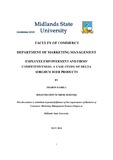Please use this identifier to cite or link to this item:
https://cris.library.msu.ac.zw//handle/11408/2235| Title: | Employee empowerment and firm’s competitiveness: A case study of Delta Sorghum beer products. | Authors: | Mariga, Sharon | Keywords: | Employee empowerment Firm’s competitiveness |
Issue Date: | May-2014 | Publisher: | Midlands State University | Abstract: | The research study was concerned with employee empowerment and firm’s competitiveness. The researcher sought to find out if there is an association between employee empowerment and firm’s competitiveness. Moreover, the researcher sought to find out if employees at Delta Chibuku were involved in decision making regarding development of products and ways in which they are involved .In addition the researcher wanted to establish the extent to which Delta had put in place empowerment practices and assess their effectiveness towards the firm’s competitiveness. An exploratory research design was used with the aid of a descriptive research design to develop initial insight and to provide direction for further study. A sample size of 85 respondents was used consisting of 40 employees, 30 customers and 15 managers from a population of 200 employees and 1500 customers respectively. Questionnaires and interviews were used as research instruments to gather data from the respondents. The overall response rate was 86% for questionnaires and 53% for interviews thus giving validity and reliability of findings. Findings show that a large portion of employees at Delta Chibuku are not involved in decision making regarding development of beer products .Findings also reveal that management at Delta only involve workers that have the knowledge and skill necessary in the development of beer products. Moreover findings indicate that, empowerment practices at Delta Chibuku include training, participative decision making and open information flow, even though the employees do not feel empowered, thus negatively impacting on the performance of beer products although several employees have agreed that they have sufficient skills to perform their jobs. Results show that only 5% of the employees are involved in idea generation, 15% in market testing, 30% in testing of the product whilst the remainder in commercialisation. Only employees with adequate skill and abilities are involved. Recommendations included the use of other empowerment practices at Delta Chibuku like collaborative work, flat organisational structures and skill and knowledge based pay systems and delegate authority and responsibility and allow decision joint decision making for the success of firm. | URI: | http://hdl.handle.net/11408/2235 |
| Appears in Collections: | Bachelor Of Commerce Marketing Management Honours Degree |
Files in This Item:
| File | Description | Size | Format | |
|---|---|---|---|---|
| MARIGA.pdf | Full text | 813.78 kB | Adobe PDF |  View/Open |
Page view(s)
124
checked on Feb 10, 2026
Download(s)
258
checked on Feb 10, 2026
Google ScholarTM
Check
Items in MSUIR are protected by copyright, with all rights reserved, unless otherwise indicated.



